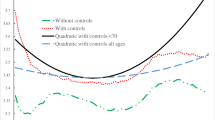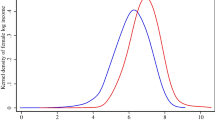Abstract
A vast “single mothers’ well-being” literature exists but has not studied single mothers’ subjective well-being (SWB). This shortcoming is important since it has been shown that there are potentially large slippages between economic indicators and SWB. Using repeated cross-sectional data from the General Social Survey 1972–2008, we examine single mothers’ happiness in the US both in absolute terms and relative to other groups: all respondents who are not single mothers, all female respondents who are not single mothers, single childless women, and married mothers. In levels, we find a significant single-mother happiness deficit compared to other groups. This deficit is explained by being single, with the happiness of single mothers statistically indistinguishable from single women without children. Over time, however, the deficit has shrunk relative to all other groups except married mothers. We discuss possible explanations for our findings, including: changes to social welfare programs, increased labor force participation, compositional shifts in single motherhood, and stigma. Our findings are most consistent with compositional shifts and changes in the stigma associated with being a single mother.

Similar content being viewed by others
Notes
Using the same data set (minus the 2008 wave), Stevenson and Wolfers (2009) report a negative trend in single mothers’ SWB. There are three main reasons for this: (1) their statistic includes whites only, and blacks—especially black women—had significant increases in SWB during this time period; (2) our definition of single mothers only includes women under the age of 45, while they consider all ages; and (3) our definition of single mothers only includes mothers with at least one child under the age of 18 living in the same household, while they do not have any such restriction.
Using data from 1980, Gruber et al. (1999) find that the “marginal child” not born as a result of abortion legalization would be 60 % more likely to be in a single-parent household than the average born child.
References
Baumeister, R. F., & Leary, M. R. (1995). The need to belong: Desire for interpersonal attachments as a fundamental human motivation. Psychological Bulletin, 117, 497–529.
Bitler, M. P., & Hoynes, H. W. (2010). The state of the social safety net in the post-welfare reform era. Brookings Papers on Economic Activity, 71–127.
Blank, R. (2002). Evaluating welfare reform in the United States. Journal of Economic Literature, 40, 1105–1166.
Di Tella, R. D., MacCulloch, R. J., & Oswald, A. J. (2003). The macroeconomics of happiness. Review of Economics and Statistics, 84, 809–827.
Diener, E. (1984). Subjective well-being. Psychological Bulletin, 95, 542–575.
Diener, E., & Oishi, S. (2005). The nonobvious social psychology of happiness. Psychological Inquiry, 16(4), 162–167.
Diener, E., & Seligman, M. E. P. (2002). Very happy people. Psychological Science, 13, 81–84.
Diener, E., & Seligman, M. E. P. (2004). Beyond money: Toward an economy of well-being. Psychological Science in the Public Interest, 5, 1–31.
Dolan, P., & Metcalfe, R. (2012). Measuring subjective wellbeing: Recommendations on measures for use by national governments. Journal of Social Policy, 41, 409–427.
Frey, B. S., & Stutzer, A. (2002). Happiness and economics. Princeton, NJ: Princeton University Press.
Grail, T. S. (2009). Custodial mothers and fathers and their child support: 2007. U.S. Census Bureau Report P60-237.
Grogger, J., & Karoly, L. A. (2005). Welfare reform: Effects of a decade of change. Cambridge, MA: Harvard University Press.
Gruber, J., Levine, P., & Steiger, D. (1999). Abortion legalization and child living circumstances: Who is the “marginal child”? Quarterly Journal of Economics, 114, 263–291.
GSS, 1972–2010: Cumulative codebook. (2011). Chicago, IL: National Opinion Research Center, The University of Chicago.
Herbst, C. M. (2012). Footloose and fancy free? Two decades of single mothers’ subjective well-being. Social Service Reivew, 86, 189–222.
Herbst, C. M. (2013). Welfare reform and the subjective well-being of single mothers. Journal of Population Economics, 26, 203–238.
Ifcher, J. (2011). The happiness of single mothers after welfare reform. The B.E. Journal of Economic Analysis & Policy, 11 (Topics).
Kahneman, D., & Deaton, A. (2010). High income improves evaluation of life but not emotional well-being. Proceedings of the National Academy of Sciences of the United States of America, 107(38), 16489–16493.
Kahneman, D., & Krueger, A. B. (2006). Developments in the measurement of subjective well-being. Journal of Economic Perspectives, 20, 3–24.
Krueger, A. B., & Schkade, D. A. (2008). The reliability of subjective well-being measures. Journal of Public Economics, 92, 1833–1845.
McLanahan, S., & Sandefur, G. D. (1994). Growing up with a single parent: What hurts, what helps. Cambridge, MA: Harvard University Press.
Meyer, B. D., & Sullivan, J. X. (2010). Further results on measuring the well-being of the poor using income and consumption. The Harris School of Public Policy Studies Working Paper #07.19.
Moffitt, R. A. (2003). Means-tested transfer programs in the United States. Chicago, IL: The University of Chicago Press.
Morin, R. (2011). The public renders a split verdict on changes in family structure. Pew Social & Demographic Trends Reports, Pew Research Center. http://pewsocialtrends.org/2011/02/16/the-public-renders-a-split-verdict-on-changes-in-family-structure/2/.
Schmidt, L. (2007). Murphy Brown revisited: Human capital. Working Paper: Search and Nonmarital Childbearing Among Educated Women.
Schwartz, B. (2004). The tyranny of choice. Scientific American, 290(4), 70–75.
Smith, T. W. (1990). Timely artifacts: A review of measurement variation in the 1972–1989 GSS. Chicago, IL: GSS Methodological Report, University of Chicago, National Opinion Research Center.
Stevenson, B., & Wolfers, J. (2008a). Economic growth and subjective well-being: Reassessing the Easterlin paradox. Brookings Papers on Economic Activity, 1–87.
Stevenson, B., & Wolfers, J. (2008b). Happiness inequality in the United States. Journal of Legal Studies, 37, S33–S79.
Stevenson, B., & Wolfers, J. (2009). The paradox of declining female happiness. American Economic Journal: Economic Policy, 1, 190–225.
Stevenson, B., & Wolfers, J. (2010). Subjective and objective indicators of racial progress. Working paper.
Stutzer, A., & Frey, B. (2006). Does marriage make people happy or do happy people get married? The Journal of Socio-Economics, 35, 326–347.
Author information
Authors and Affiliations
Corresponding author
Additional information
We would like to thank the anonymous referees for their helpful comments. John Ifcher and Homa Zarghamee have contributed equally to this work.
Rights and permissions
About this article
Cite this article
Ifcher, J., Zarghamee, H. The Happiness of Single Mothers: Evidence from the General Social Survey. J Happiness Stud 15, 1219–1238 (2014). https://doi.org/10.1007/s10902-013-9472-5
Published:
Issue Date:
DOI: https://doi.org/10.1007/s10902-013-9472-5




